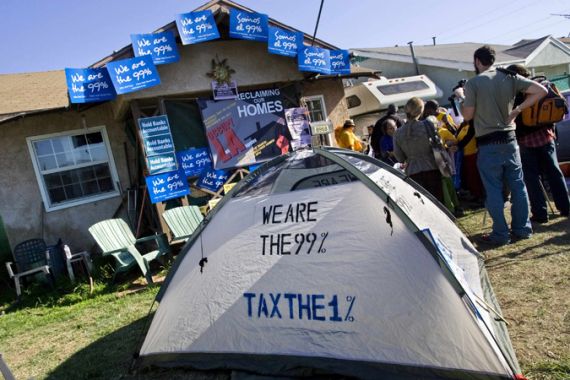Occupy protesters target foreclosed homes
Rallies staged in more than 25 US cities on behalf of homeowners facing evictions in move seen as a tactical shift.

 |
| Protesters are demanding that banks keep families in their homes [Reuters] |
Occupy protesters across the US are reclaiming foreclosed homes and boarded-up properties, signalling a tactical shift for the movement against wealth inequality.
On Tuesday, groups in more than 25 cities held protests on behalf of homeowners facing evictions.
In New York, they marched through a residential neighbourhood in Brooklyn carrying signs that read “Foreclose on banks, not people”. At the end of the rally, protesters introduced members of a homeless family and said they planned to renovate and clean up a house they said had been abandoned by a bank for the family to live in.
In Portland, a press conference was held at the home of a woman facing foreclosure next March. She vowed to stay in her house until authorities take her out.
“We belong here,” said Deb Austin, who said she fell behind in payments after a cancer diagnosis and after her husband lost her second job. “And we’re not leaving.”
In Atlanta, protesters held a rally at a county courthouse and used whistles and sirens to disrupt an auction of seized houses.
Los Angeles protesters rallied around a family of five who plans to reclaim the home they lost six months ago in foreclosure.
“It’s pretty clear that the fight is against the banks, and the Occupy movement is about occupying spaces,” Jeff Ordower, one of the organisers of Occupy Homes, said. “So occupying a space that should belong to homeowners but belongs to the banks seems like the logical next step for the Occupy movement.”
Lingering frustration
The events reflect the protesters’ lingering frustration over the housing crisis that has sent millions of homes into foreclosure after the burst of the housing bubble that helped cripple the country’s economy.
Nearly a quarter of all US homeowners with mortgages now owe more than their homes are worth, representing nearly 11 million homes, according to CoreLogic, a real estate research firm.
Protesters say banks and financial firms own abandoned foreclosed houses that could be housing people.
Seattle has become a leader in the anti-foreclosure movement as protesters took over a formerly boarded-up warehouse slated for demolition last weekend.
In an announcement, the protesters said they planned to make the warehouse into a community centre, and hosted a party the night they opened the building. Police moved in soon after, arresting 16 people in the process of clearing it out.
‘Trespassers’
While arrests have already been made in a couple of squatting cases in Seattle and Portland, it remains to be seen how authorities will react to this latest tactic.
In Portland, police spokesman Pete Simpson said he was aware that the movement called for people to occupy foreclosed homes, but said it is difficult to distinguish between the people who would squat in homes as a political statement and those that do it for shelter.
“The vacant property issue is of concern in cities nationwide,” Simpson said. “We’ll treat them all as trespassers.”
Seattle police spokesman Sean Whitcomb said his department sees squatting in private properties as the same sort of trespassing that Occupy Seattle committed when it camped in a downtown park.
“It’s no different than when people were trespassing [in the park],” Whitcomb said. “We went nights and days, letting people camp in the park. We relied on education and outreach, rather than enforcing the law to the letter.”
Meanwhile, there were at least two setbacks for police who have been at odds with the Occupy protesters.
In New Orleans, a federal judge allowed Occupy protesters and homeless people to return to the New Orleans park where they had been camped since early October.
Congressman Jerrold Nadler meanwhile called on the US Department of Justice to investigate allegations of police misconduct in connection with the treatment of Occupy Wall Street protesters and journalists covering the demonstrations in New York City.
The New York Democrat said in a letter to Attorney-General Eric Holder there were “troubling reports” of possible misconduct by police including “possible unlawful surveillance” of protesters’ constitutionally protected activities and excessive use of force by New York Police Department officers.
NYPD spokesman Paul Browne said officers “accommodated lawful protest” and made arrests only after observing unlawful conduct.